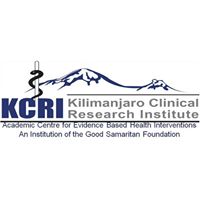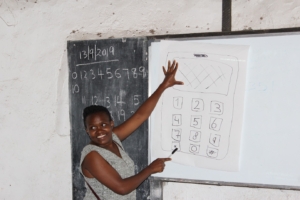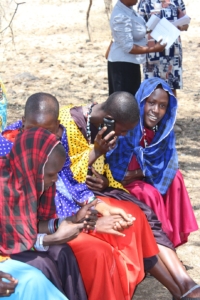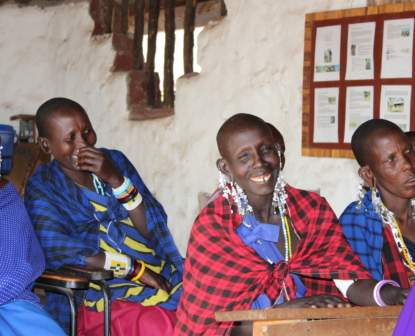Project
Ondoilo: the voice of Maasai in Family Planning
-
Amount Funded
182,846 EUROProject Duration
01 May 2018 - 30 Apr 2020 -
-
Lead organisation
-
The Kilimanjaro Clinical Research Institute (KCRI) is a young academic centre for evidence -based health interventions. They have the ambition to be an internationally distinguished Centre of Excellence in Health Research with the mission to conduct and coordinate high quality biomedical research which will provide evidence for medical interventions and global health policies development.
One of the main themes is research and innovations with the strategic objective to increase the capacity of KCRI to conduct research by 10% annually in all key priority health research thematic areas in the country. Reproductive, maternal and child health is the third national health research priority of Tanzania, product development and commercialisation the fourth and bioinformatics and information technology the seventh. All three priorities are part of the project supported by Voice.-
Organisation
The Kilimanjaro Clinical Research Institute (KCRI) is a young academic centre for evidence -based health interventions. They have the ambition to be an internationally distinguished Centre of Excellence in Health Research with the mission to conduct and coordinate high quality biomedical research which will provide evidence for medical interventions and global health policies development.
One of the main themes is research and innovations with the strategic objective to increase the capacity of KCRI to conduct research by 10% annually in all key priority health research thematic areas in the country. Reproductive, maternal and child health is the third national health research priority of Tanzania, product development and commercialisation the fourth and bioinformatics and information technology the seventh. All three priorities are part of the project supported by Voice. -
Project
The Maasai living in Esilalei (Monduli District, Arusha Region, Tanzania) have difficulties in feeding their children as the grazing grounds for their cattle are decreasing due to increasing urbanisation and land grabbing for wildlife areas. They wish to reduce their number of children, but access to family planning services and knowledge is limited. As the number of mobile phone users among Maasai in Esilalei is extremely high, the project Voices of Maasai in Family Planning uses mobile communication to increase their access and knowledge. As part of the project a mobile health platform for Maasai and health care workers in Esilalei is developed. The area of Esilalei was chosen as there is a need for family planning methods in that area. Through increasing dialogue using the platform, the aim is to give voice to Maasai and as such increase their access to family planning services.
The mHealth platform aims to (1) educate Maasai on fertility and family planning methods and (2) give way for Maasai to inform health care workers about their traditions considering birthing and family planning. The platform uses interactive voice response calling and the Maa language (local Maasai language) in order to increase use of the system by Maasai. The system is developed together with Maasai and tested among 32 Maasai couples and 20 health care workers in and around Esilalei for a period of six months. The development and testing of the platform goes hand in hand with seminars for education on fertility, family planning methods, other reproductive health issues and mobile phone use.
The expectation is that the project leads to increased knowledge about family planning and use of family planning methods among Maasai in Esilalei. In addition, it may give way to increase dialogue about other relevant reproductive health issues such as female genital mutilation and traditional home delivery. Furthermore, using interactive voice response calling is a new way of mobile health communication in Tanzania, so it may increase mHealth capacity in our country, which may lead to expanded use for other conditions and people. Lastly, if the system shows to be effective among Maasai in Esilalei, it can be expanded to other (more remote) regions where Maasai are living.
-
-
The Maasai living in Esilalei (Monduli District, Arusha Region, Tanzania) have difficulties in feeding their children as the grazing grounds for their cattle are decreasing due to increasing urbanisation and land grabbing for wildlife areas. They wish to reduce their number of children, but access to family planning services and knowledge is limited. As the number of mobile phone users among Maasai in Esilalei is extremely high, the project Voices of Maasai in Family Planning uses mobile communication to increase their access and knowledge. As part of the project a mobile health platform for Maasai and health care workers in Esilalei is developed. The area of Esilalei was chosen as there is a need for family planning methods in that area. Through increasing dialogue using the platform, the aim is to give voice to Maasai and as such increase their access to family planning services.
The mHealth platform aims to (1) educate Maasai on fertility and family planning methods and (2) give way for Maasai to inform health care workers about their traditions considering birthing and family planning. The platform uses interactive voice response calling and the Maa language (local Maasai language) in order to increase use of the system by Maasai. The system is developed together with Maasai and tested among 32 Maasai couples and 20 health care workers in and around Esilalei for a period of six months. The development and testing of the platform goes hand in hand with seminars for education on fertility, family planning methods, other reproductive health issues and mobile phone use.
The expectation is that the project leads to increased knowledge about family planning and use of family planning methods among Maasai in Esilalei. In addition, it may give way to increase dialogue about other relevant reproductive health issues such as female genital mutilation and traditional home delivery. Furthermore, using interactive voice response calling is a new way of mobile health communication in Tanzania, so it may increase mHealth capacity in our country, which may lead to expanded use for other conditions and people. Lastly, if the system shows to be effective among Maasai in Esilalei, it can be expanded to other (more remote) regions where Maasai are living.
-
Kilimanjaro Clinical Research Institute (KCRI) observed increased awareness about family planning and reproductive health in the Maasai community living in Esilalei (Monduli District, Arusha Region, Tanzania). As a result, the community now understands that family planning is not something negative as they had thought before KCRI began working with the community.
KCRI’s development of the Embiotishu, a digital voice interactive call-in platform in the Maasai language, provided free and easy access to family planning and reproductive health education. The platform was viewed as a valued resource by the community. They encouraged KCRI to partner with Orkonorei Radio Service that broadcasts in the Maasai language to provide family planning and reproductive health to other Maasai communities in the region.

KCRI member training community members on how to use the Embiotishu platform. When KCRI implemented the Embiotishu digital platform in October 2019, they aimed to reach 150 people (75 couples). But based on the number of calls made to the platform, an estimated 645 people called the platform surpassing KCRI’s goal. Thus, KCRI has not only managed to educate the local community in Esilalei, but they have also gathered valuable data on the understanding of family planning among the Maasai community. In addition, five individuals from the community (two men and three women) were trained to conduct focus groups and face-to-face interviews to assist in the data collection.

Community members using Embiotishu platform during a training session. KCRI plans to continue implementing the development system through other funders and use the data gathered in this project for two papers to be submitted to scientific journals that focus on East African health and family planning in general.
-
News






